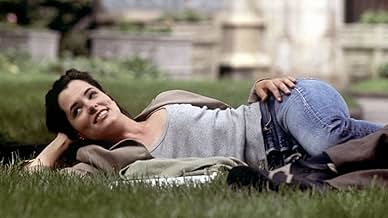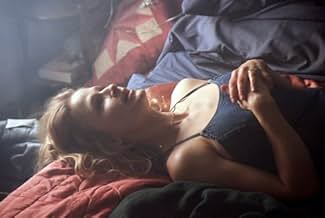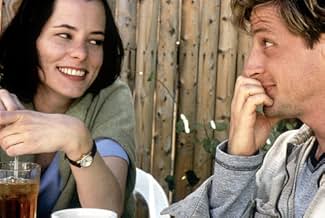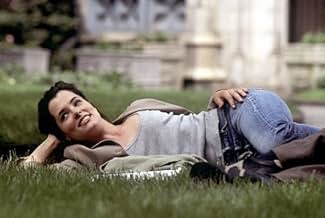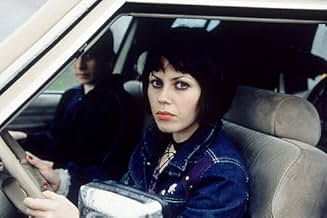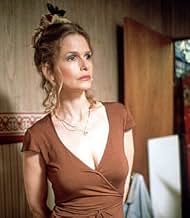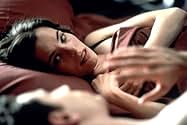AVALIAÇÃO DA IMDb
6,4/10
4,1 mil
SUA AVALIAÇÃO
Adicionar um enredo no seu idiomaThree women's escapes from their afflicted lives. Each struggles to flee from the men who confine their personal freedom.Three women's escapes from their afflicted lives. Each struggles to flee from the men who confine their personal freedom.Three women's escapes from their afflicted lives. Each struggles to flee from the men who confine their personal freedom.
- Prêmios
- 6 vitórias e 5 indicações no total
John Ventimiglia
- Narrator
- (narração)
Joel de la Fuente
- Thavi Matola
- (as Joel De La Fuente)
Avaliações em destaque
I don't know why there are so many recent attempts at this sort of thing: individual episodes that approach and overlap the same concept. Perhaps it is because it is easier to craft episodes with power rather than worry about an arc of 90 minutes or more.
But we do have them. Some work amazingly well. I found 'Things you can tell' nearly lifealtering because of the crafty way all the actresses picked up each others' mannerisms to merge into the same woman. '!0 Conversations' was a different take, with the action all occurring in the same world. Less effective overall (with a more overt politics) but well structured.
This, however, is a mess. It bludgeons. It repeats. It insists on obviousness. No subtly is allowed: either an effect shouts or is bleached away. And the worst thing, the most damaging thing that can be said: there is no reward, no insight, no enrichment for the rawness we experience.
Wallace Shawn and a talented cinematographer wasted as well. Shame.
The reliable Parker Posey has a line so wonderful, so noticeably superior to all else, I am convinced she made it up: she says she needs to get an underwater camera.
Ted's Evaluation -- 1 of 4: You can find something better to do with this part of your life.
But we do have them. Some work amazingly well. I found 'Things you can tell' nearly lifealtering because of the crafty way all the actresses picked up each others' mannerisms to merge into the same woman. '!0 Conversations' was a different take, with the action all occurring in the same world. Less effective overall (with a more overt politics) but well structured.
This, however, is a mess. It bludgeons. It repeats. It insists on obviousness. No subtly is allowed: either an effect shouts or is bleached away. And the worst thing, the most damaging thing that can be said: there is no reward, no insight, no enrichment for the rawness we experience.
Wallace Shawn and a talented cinematographer wasted as well. Shame.
The reliable Parker Posey has a line so wonderful, so noticeably superior to all else, I am convinced she made it up: she says she needs to get an underwater camera.
Ted's Evaluation -- 1 of 4: You can find something better to do with this part of your life.
I am hard-pressed to explain the praise heaped on this movie, and must sadly choose the obvious. This film would never have been touted as it has if it were made by someone other than Arthur Miller's daughter/Daniel Day Lewis's wife.
Of the film's three vignettes--domestic violence survivor, conflicted editor, and confused runaway--the second is most telling. Greta, the failure to her family, craves success and power in the literary world and only needs to have her innate talents recognized to do so. Her skill is "trimming the fat" from others' writing. However, Ms. Miller seems to have had no such attention paid to her own work. The incessant and intrusive voiceover dialogue, I assume taken directly from her collection of short stories, features pseudo-deep lines that made me literally laugh out loud.
In addition, I found many of the camera tricks and plot devices amateurish and the characters shallow and essentialized. I cannot recommend this film, which basks in its own specialness and its claims to gritty reality. Ms. Miller is a tourist in the lives of the struggling women she attempts to portray.
Of the film's three vignettes--domestic violence survivor, conflicted editor, and confused runaway--the second is most telling. Greta, the failure to her family, craves success and power in the literary world and only needs to have her innate talents recognized to do so. Her skill is "trimming the fat" from others' writing. However, Ms. Miller seems to have had no such attention paid to her own work. The incessant and intrusive voiceover dialogue, I assume taken directly from her collection of short stories, features pseudo-deep lines that made me literally laugh out loud.
In addition, I found many of the camera tricks and plot devices amateurish and the characters shallow and essentialized. I cannot recommend this film, which basks in its own specialness and its claims to gritty reality. Ms. Miller is a tourist in the lives of the struggling women she attempts to portray.
I saw this film tonight at the First Annual Tribeca Film Festival and understood its success at Sundance. In short, this film is about the awakening of three different women in very different lives and circle around a news report of a shooting in Manhattan and an ensuing car accident. With the telling of each woman's tale, Miller uses a brilliant 'degree of relation' to the accident in order to develop an engaging and powerful film.
Delia casually watches the news report of the accident while waiting for the cook to bring up her next order in a small-town diner in upstate New York. Though the audience does not see a particularly unusual response that she has to it, we can imagine that her difficult circumstances allow her to relate to it on a level of shared human suffering.
Greta, who's story is told in a series of flashbacks, watches it on the morning news minutes before she has her epiphany about her failing marriage and the new turn that her life is taking as a prominent editor for a large Manhattan publishing house. Because it is the only scene in her story that takes place in the present time, the audience is left to wonder what sort of pivotal role the news report has played in her epiphany.
Finally, Paula's story brings the accident close to home as she is a witness to it. Her epiphany was a direct result of the accident since it was a near-death experience for her. She's not only shocked from the impact of it, but her struggle to explain it with cosmic signs allows her to transcend the accident and the events following it.
The performances were real, the direction was brilliant, and the common thread that ran through the intimate details of the women's awakenings flowed easily, despite the segmented telling of their tales. Miller's work in this film has inspired me to seek out her feature debut, _Angela_ as well.
Delia casually watches the news report of the accident while waiting for the cook to bring up her next order in a small-town diner in upstate New York. Though the audience does not see a particularly unusual response that she has to it, we can imagine that her difficult circumstances allow her to relate to it on a level of shared human suffering.
Greta, who's story is told in a series of flashbacks, watches it on the morning news minutes before she has her epiphany about her failing marriage and the new turn that her life is taking as a prominent editor for a large Manhattan publishing house. Because it is the only scene in her story that takes place in the present time, the audience is left to wonder what sort of pivotal role the news report has played in her epiphany.
Finally, Paula's story brings the accident close to home as she is a witness to it. Her epiphany was a direct result of the accident since it was a near-death experience for her. She's not only shocked from the impact of it, but her struggle to explain it with cosmic signs allows her to transcend the accident and the events following it.
The performances were real, the direction was brilliant, and the common thread that ran through the intimate details of the women's awakenings flowed easily, despite the segmented telling of their tales. Miller's work in this film has inspired me to seek out her feature debut, _Angela_ as well.
The best thing about this film are the three superb performances by the lead actresses in each segment. It's also a chance to explore the potential for short form film narrative by putting three short films together to create a full length feature. If these three films had been produced individually, almost no one would ever see them. The film is exciting too, as an example of the artistic possibilities of low budget digital film making. As others have mentioned the narration almost sinks the movie. I'd love to see a DVD alternative version without it.
A critic I read before seeing this movie (Lynden Barber of the Sydney Morning Herald) opined that it was a book illustrated with film rather than a proper movie. He's right, but that does not make it a complete write-off. There is as much voice-over as in a football match (why use a male?) but the visuals still convey some of the stories, which are not all without interest.
There are three separate stories of women having trouble with men; two from the working class and one an upwardly mobile book editor. They are tenuously connected by a street incident. One has a bashing husband, another, a husband she has outgrown, and the third has problems with her boyfriend, her stepfather and her maternal instinct. All seem to favour running away as the solution; stand and fight is not the female way, at least not in New York State.
The author of the original short stories is Rebecca Miller, who also directed from her own screenplay. This certainly accounts for the literary quality. Rebecca has a famous literary father, the great Arthur Miller, and I suspect he is in the film somewhere as a character or at least a presence. The working class girl stories are too trite to be involving (though very well played by Kyra Sedgwick and Fairuza Balk) but the middle story of the book editor (played coolly by Parker Posey) rings true. The use of digital video suits the subject-matter (Dogma 95 on the Hudson) and the whole thing is competently realised. It is the weakness in the first and third stories that disappoints.
There are three separate stories of women having trouble with men; two from the working class and one an upwardly mobile book editor. They are tenuously connected by a street incident. One has a bashing husband, another, a husband she has outgrown, and the third has problems with her boyfriend, her stepfather and her maternal instinct. All seem to favour running away as the solution; stand and fight is not the female way, at least not in New York State.
The author of the original short stories is Rebecca Miller, who also directed from her own screenplay. This certainly accounts for the literary quality. Rebecca has a famous literary father, the great Arthur Miller, and I suspect he is in the film somewhere as a character or at least a presence. The working class girl stories are too trite to be involving (though very well played by Kyra Sedgwick and Fairuza Balk) but the middle story of the book editor (played coolly by Parker Posey) rings true. The use of digital video suits the subject-matter (Dogma 95 on the Hudson) and the whole thing is competently realised. It is the weakness in the first and third stories that disappoints.
Você sabia?
- CuriosidadesMaria Elena Ramirez's debut.
- Citações
Greta Herskowitz: How could he still love me? If he does, it's because he doesn't know me. I'm rotten with ambition, a lusty little troll, the kind of demon you'd find at the bottom floor of hell pulling fingernails off the loansharks.
- Cenas durante ou pós-créditosTo my mother
- ConexõesFeatured in Personal Velocity: Creating 'Personal Velocity' (2003)
Principais escolhas
Faça login para avaliar e ver a lista de recomendações personalizadas
- How long is Personal Velocity?Fornecido pela Alexa
Detalhes
- Data de lançamento
- País de origem
- Idioma
- Também conhecido como
- Personal Velocity: Three Portraits
- Locações de filme
- Empresas de produção
- Consulte mais créditos da empresa na IMDbPro
Bilheteria
- Orçamento
- US$ 125.000 (estimativa)
- Faturamento bruto nos EUA e Canadá
- US$ 811.299
- Fim de semana de estreia nos EUA e Canadá
- US$ 29.943
- 24 de nov. de 2002
- Faturamento bruto mundial
- US$ 890.502
- Tempo de duração
- 1 h 26 min(86 min)
- Cor
- Mixagem de som
- Proporção
- 1.85 : 1
Contribua para esta página
Sugerir uma alteração ou adicionar conteúdo ausente


